
OR
Republica Interview
Government and opposition guided by psychology of instability
Published On: July 29, 2018 12:03 AM NPT By: Thira L Bhusal/Mahabir Paudyal
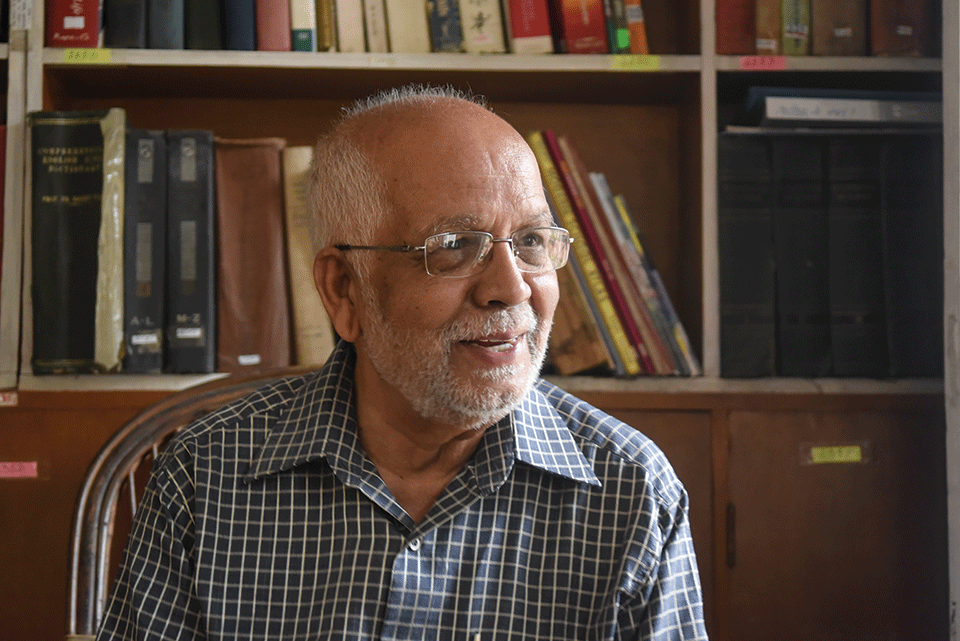
Former minister, political analyst and member of Eminent Persons Group (EPG) from Nepal, Nilamber Acharya knows Nepali politics inside out. What is his assessment of current politics and debate on authoritarianism? How should the government and opposition conduct themselves? What is the progress in EPG? Thira L Bhusal and Mahabir Paudyal caught up with him to discuss.
Nepal’s democrats and communists have stood together in major political events. The idea that communists are necessarily authoritarian is flawed.
Psychology of instability has weakened opposition party as much as it has weakened the governing party.
Both the government and the opposition should work in a way that leaves no room for forces of instability to manipulate the situation.
If we interpret minor incidents as signs of authoritarianism, what will we say when the government becomes really authoritarian?
We need to be mindful of the fact that our opposition of the government does not entail threat of instability or threat on national interest.
Five months in power, all public hopes and enthusiasm on the government of K P Oli seem to be declining. Why does the government become unpopular so fast in Nepal?
For long we have lived with psychology of instability. We have not seen the government serving out full five years term in decades. Thus party in the opposition becomes restless after remaining out of the government for four to five months. Those in power are guided by the fear that if they do not make visible accomplishments within four to five months, they will become unpopular and people will question them. So the parties in power start making tall promises, even those that cannot be realized to keep people hopeful. In the process, the party in power ignores what must be and can be immediately done and starts floating ambitious and unrealistic plans. When those plans do not translate into reality, people lose trust and the impression is created that the government is failing.
Second, we changed government system, election system, governing philosophies and principles. But we failed to change our political culture, character, behavior and conduct. The result is there for us all to see. For the first time after decades, we have an elected two thirds majority government. And yet the government does not feel confident that it will be able to deliver. It seems to be confused and panicking at times. On the other hand, the opposition party too seems to be guided by the psychology that it has lost everything by losing one election. Parties always get second chance. But conversely, the opposition party seems to be guided by the idea that it might remain out of power forever. The psychology of instability has weakened opposition party as much as it has weakened the governing party.
How does the psychology of instability actually play out? Will you elaborate on it?
Let me explain with an example. A group of people from some place or region takes to the street protests raising untenable demands. And the government in power responds by signing agreements to fulfill those demands. It does so not because the demands may be valid and rational, but because it does not want to offend protesting party thinking ‘we will remain in power for short time, so why offend anyone?’ The person in power then promises to fulfill even the most intractable demands. But such demands cannot be fulfilled neither by him nor his successor. As a result, neither the protesting party will get their demands fulfilled nor the person, who promises, will be able to deliver on those promises. This leads to another cycle of protests, agreements and failure to implement those agreements. Those in power have always tended to avoid the problems for the immediate run without thinking of long-term repercussions of such acts. We had been doing precisely that for nearly a decade. Various governments promised various things with Madhesi parties and other outfits. Have they been fulfilled? Have not they remained controversial? This is how psychology of instability affects politics. Our political class has failed to deal with such issues with deserved seriousness. Everyone promises everything but nobody is able to fulfill those promises. This characteristic must change fundamentally.
We have a stable government at the moment. Should not it take steps for such change?
It should, but it is not doing. There is where the problem lies. The government elected for five years should plan and set the priorities well. Instead of indulging in petty things, it should focus on long-term issues. But it is doing the opposite. Why did it, for example, have to declare Maiti Ghar Mandala a protest-free zone? Why did it deal with vice-chancellor of Mahendra Sanskrit University in such an insulting manner?
The government should be alert about the fact that there are forces bent on creating instability in the country. Opposition party should remain as conscious about it. Both the government and the opposition should work in a way that leaves no room for forces of instability to manipulate the situation. They need to be aware of the fact that their opposition to the government does not escalate into opposition of the political system the new constitution has brought into.
Neither party seems to have taken this issue seriously. Neither the opposition party has displayed patience to wait until next election nor has the governing party realized that their mishandling of the system might lead to creating threat for political system itself.
Main opposition Nepali Congress has been saying that communist government is going on totalitarian path. What do you say?
The anti-communist rhetoric does not sound convincing to me. Communists and democrats have worked together in Nepal’s political history. They fought together against Panchayat in 1990 and together they fought against monarchy in 2006. So how can you now say since communists are in power, the country is headed toward totalitarianism? They have been in the government together with the communists in the past. They have been together in constitution making process. Nepal’s democrats and communists have stood together in major political events.
The opposition seems to be guided with this belief that communists are necessarily bad. They argue that communists become totalitarian because communists of Soviet Union were totalitarian. We are talking about communists of Nepal, the communists who have followed democratic process to rise to power. We should not forget Nepali reality. Democrats should rather be happy that communists have not deviated from democratic path.
We must not lose sight of what will come if we fail to handle politics right at the moment. While we criticize the government, we must also be able to provide alternative actions and policies to the actions and policies taken by the government. Protest for the sake of protest won’t do much good. The people have given mandate to this government for five years. The government should be serious about this mandate and work responsibly. At the same time, the opposition should also bear in mind that this government is there to stay for five years. Its duty is to make the government accountable. Like I said, any protest by the opposition should not be directed toward questioning the very system.
Many interpreted protest ban in Maiti Ghar and government’s late response to Dr Govinda KC’s demands as initial signs of authoritarian rule. How are we to understand this?
The government made mistake on Maiti Ghar protest ban. But has not the Supreme Court reversed this decision? In totalitarian or authoritarian rule, government decision is not annulled by the court. People have been protesting. Media has vocally criticized the government. Where do you see authoritarianism in this? Yes, governments make mistakes, sometimes knowingly. Such mistakes should be opposed and the government should be made to correct it. We should not react disproportionately to small action. If we interpret minor incidents as signs of authoritarianism, what will we say when government becomes really authoritarian?
We must constantly watch and warn the government. Detention of a university of vice-chancellor and that of a doctor from Bir Hospital was condemnable act and it should be called so. But on other fronts we seem to be reacting rather disproportionately. Let us not try to cut the paper with an axe.
There is nothing like absolute truth in a democracy. It is not wise of the opposition to accuse the government of becoming authoritarian simply because it is not acting as per its wishes. Likewise, the government must not think that they have the two thirds majority, what they do and say is only truth and all else is false. Democracy recognizes multiple truths and respects different opinions. Regarding Dr Govinda KC’s hunger strike, his demands are absolutely valid. I am happy that the government finally addressed his demands but it should not have taken such a long time.
The government is becoming increasingly intolerant toward opposition views. What does it indicate?
First of all, civil society, media and opposition need to give up the notion that this is the two thirds majority government and it will gobble them up or that it is a two thirds majority government and therefore it is necessarily autocratic and authoritarian. They need to raise voice when the government makes mistakes. Why has the government failed to frame necessary laws even as we are nearing third anniversary of constitution promulgation? Why is the opposition not raising this issue? It must not wait for the situation where the government makes mistake and opposition can make an issue out of it. If you say that the government has become intolerant, you have to say where it has become intolerant. I don’t think the media and civil society should feel intimidated. They have been writing and speaking against the government.
Political parties often exchange acrimonious words to describe each other. How important is decency of speech in politics?
My experience has been that soft words have greater impacts than harsh words. You do not have to resort to hard words to get your message across. Prime minister, ministers, heads of constitutional bodies and government officials should use decent words. You cannot take the excuse of youth or innocence. What they do and say should be something for others to follow.
We also have the tendency of justifying the wrongdoing by pointing finger at similar wrongdoing of the past. Say that this government is not doing well and they will say ‘was its predecessor any better?’ Say that opposition is not working responsibly and they will say ‘how responsible were you when you were in the opposition?’ The fact that the government in the past made a mistake does not mean the present government is entitled to make mistakes too. This kind of debate only allows political actors to deviate from real agenda.
Then why do political leaders use harsh words?
It has got to do with our political history. Our political leadership emerged from protests and revolution. Speaking hard words became the norm. When a leader speaks in harsh terms against another leader, he is applauded by his cadres and he comes to believe this is the way to speak in public. We need to make a sharp departure from this political rhetoric. But we have not been able to adopt conducts and characters that are needed to take forward new political system. This is the right time to set the new rule and new rhetoric. We are at the crucial point at the moment because we are charting future course according to the new constitution. First years of constitution implementation become important because this is the time for setting new traditions and rules. If we fail now, we might fail in the future.
Our political history has been that of making and breaking the government within a matter of few months. As a result no political party has gained full experience of how to conduct the state of affairs or how to conduct themselves as a responsible entity. Consider this. The elected government of 1959 could not serve full term. Nor the government elected under the constitution of 1990 could do so. What would have happened if the government of B P Koirala was allowed to serve for five years? Or for that matter if the government of 1990 could serve for full five years time? A lot many things would have been different. Stability is important. Therefore, we need to be mindful of the fact that our opposition of the government does not entail threat of instability or threat on national interest.
Let’s change the track. What is the progress on EPG? And how will EPG recommendations change our relation with India?
I cannot tell you content of the report because the report must first be submitted to the government. Final report has been prepared. EPGs of both India and Nepal are waiting for the time to submit it to respective governments. Our relation with India has so far been guided by the context of 1950, while lot many things have changed in both countries. In the last 68 years, India has changed, Nepal has changed, the world has changed. Our international relations have expanded globally. Our needs have changed and our capacities have also been strengthened.
We have worked in such way that if followed in letter and spirit our recommendations will make it easier to redefine our relations based on present context and based on sovereignty and independence of each other. I am hopeful that when recommendations of EPG will be implemented, it will end all bitterness of the past, enhance each other’s dignity and strengthen the relation between the countries and people. You will know more when the report becomes public.
Finally, how do you see this government handling foreign relation?
Our foreign policy has been guided by the idea of preserving our sovereignty and independence, expanding our relations with other countries in the world and safeguarding our national interests. This is the direction of our foreign policy. Yes, we have not been able to move forward in this spirit all the time. But our foreign policy is in right track at the moment.
At the moment, foreign relations of big countries are rather fluid. The government should be mindful of this change and conduct accordingly. We need to realize that our economic development is directly linked with our foreign relation. I believe the government is working with this realization.
You May Like This
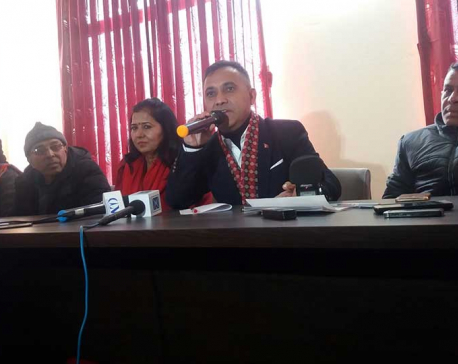
Politics should be guided by agendas not by age: NC spokesperson
KATHMANDU, Jan 10: Nepali Congress spokesperson Bishow Prakash Sharma has said that the politics should be guided by agendas rather... Read More...

Mentored by Michael Clarke, backed by Ricky Ponting, Sandeep Lamichhane gets IPL call
Back in 2016, Delhi Daredevils scouts looking out for a young spinner zeroed in on a Nepali leggie by the... Read More...

Government: 36 Islamic State fighters killed by massive bomb
KABUL, Afghanistan, April 14: The attack on a tunnel complex in remote eastern Afghanistan with the largest non-nuclear weapon ever used... Read More...




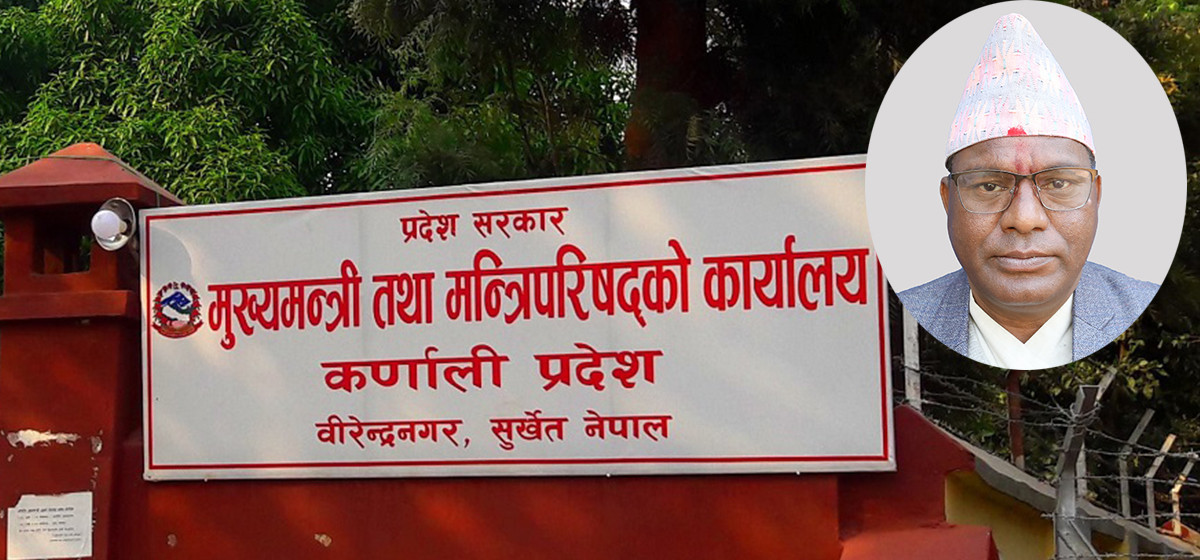

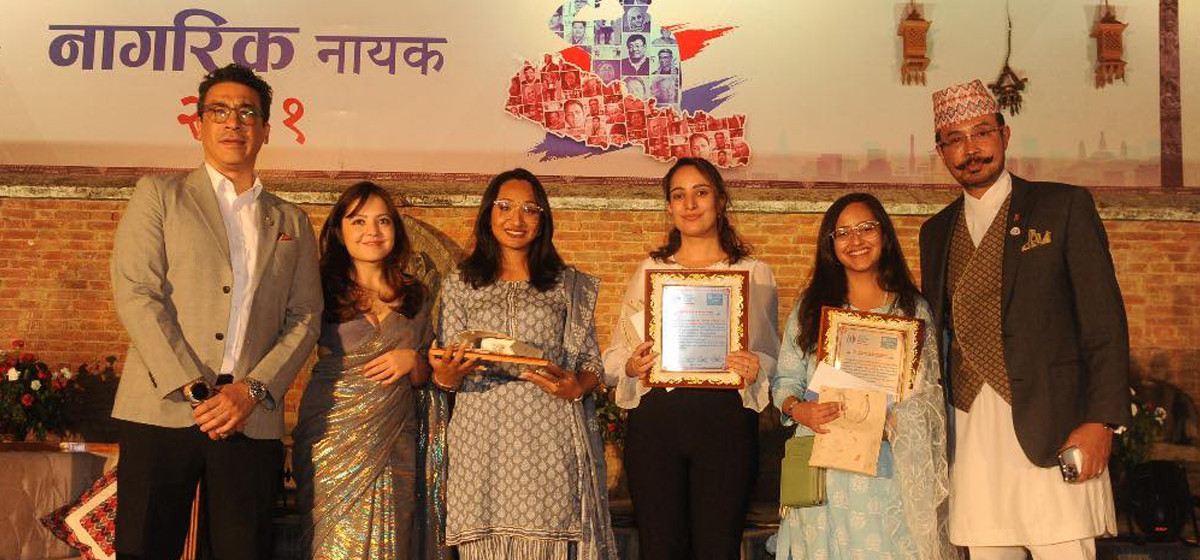

Just In
- Youth found dead in a hotel in Janakpur
- CM Kandel to expand cabinet in Karnali province, Pariyar from Maoist Center to become minister without portfolio
- Storm likely to occur in Terai, weather to remain clear in remaining regions
- Prez Paudel solicits Qatar’s investment in Nepal’s water resources, agriculture and tourism sectors
- Fire destroys 700 hectares forest area in Myagdi
- Three youths awarded 'Creators Champions'
- King of Qatar to hold meeting with PM Dahal, preparations underway to sign six bilateral agreements
- Nepal's Seismic Struggle and Ongoing Recovery Dynamics



_20240423174443.jpg)






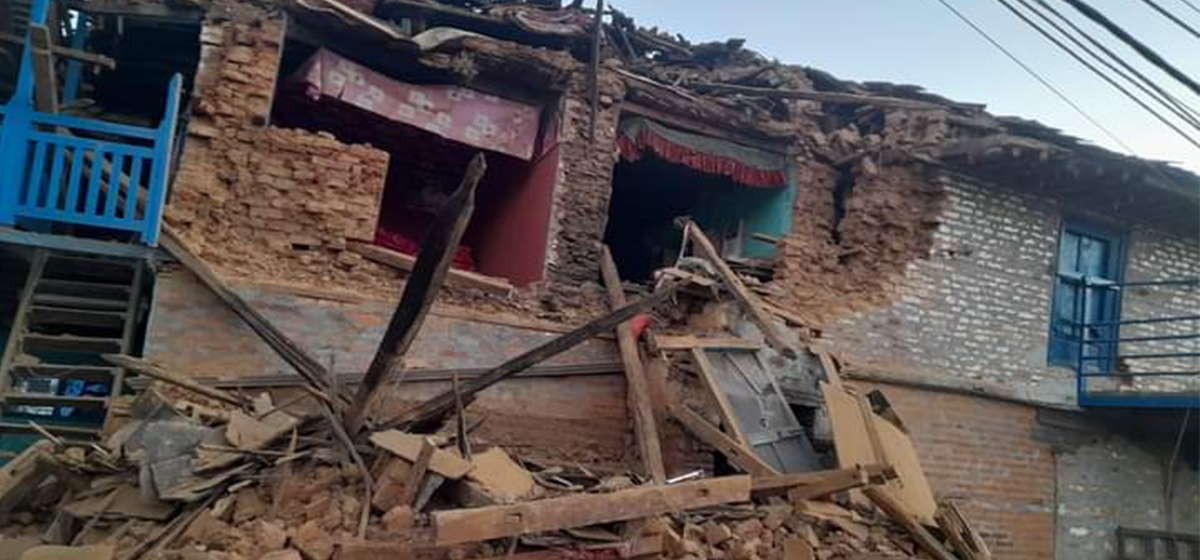
Leave A Comment